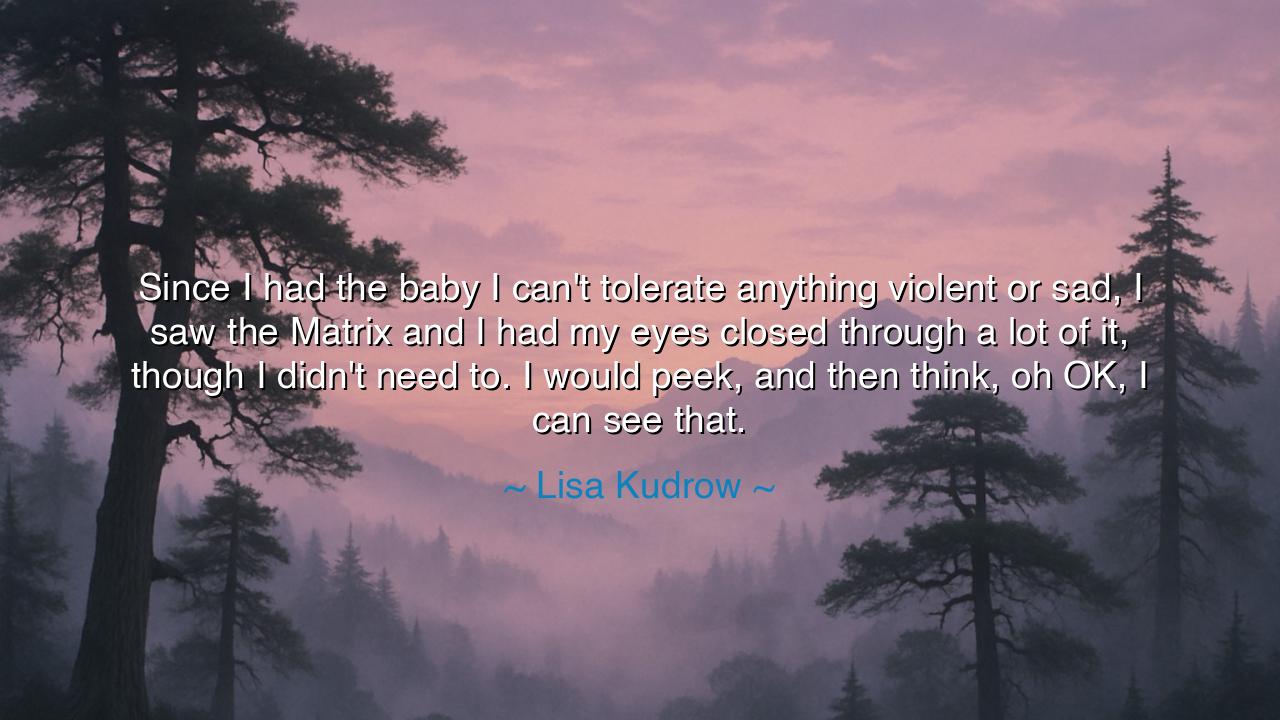
Since I had the baby I can't tolerate anything violent or sad, I
Since I had the baby I can't tolerate anything violent or sad, I saw the Matrix and I had my eyes closed through a lot of it, though I didn't need to. I would peek, and then think, oh OK, I can see that.






Hear, O children of tenderness and guardians of life, the words of Lisa Kudrow, who, in the season of new motherhood, spoke with honesty and vulnerability: “Since I had the baby I can't tolerate anything violent or sad, I saw The Matrix and I had my eyes closed through a lot of it, though I didn't need to. I would peek, and then think, oh OK, I can see that.” This confession, though wrapped in simplicity, carries within it the eternal transformation of the human soul when touched by the presence of new life. It is not merely about cinema, nor about fear, but about the softening of the heart when love deepens.
The meaning of her words lies in the change that motherhood brings. Where once she could face stories of violence and sorrow with indifference, now her heart recoils. For when a child is born, the mother is born anew as well—her heart stretched, her compassion awakened, her spirit made porous to suffering. The violent and sad are no longer distant fictions; they are wounds too close to bear, shadows that now fall upon the fragile light she holds in her arms. It is as though the veil between herself and the world has grown thin, and every cruelty now cuts more deeply.
History bears witness to this transformation of compassion. Think of Queen Victoria, who after the birth of her children was said to weep more readily at tragedies and feel more keenly the suffering of her people. Or consider the stories of countless mothers during wars, who could not bear the sounds of gunfire, for each shot echoed as a threat against their own sons and daughters. The birth of life awakens in the heart an intolerance for death’s shadow. Kudrow’s aversion to violence on screen is the gentlest reflection of a profound truth: the greater our love, the greater our sorrow at the sight of suffering.
At the same time, her words carry humor and humility. She admits she closed her eyes not out of true danger, but out of her new sensitivity, only to peek and realize the scene was bearable. Here we see another truth: that fear, once awakened by love, often anticipates suffering before it comes. Motherhood, and love in general, heighten both imagination and vulnerability. The protective instinct extends beyond the child to all of creation, making the soul tender, cautious, and ready to shield against harm—even when that harm is imagined.
The lesson of Kudrow’s reflection is that love transforms how we see the world. When we love deeply—whether as mothers, fathers, friends, or companions—we can no longer endure violence as entertainment, nor sadness as mere story. Life becomes more precious, and our compassion extends outward. What once was distant now feels near. This transformation is not weakness, but strength, for it reveals the soul’s awakening to the value of every life, to the weight of every sorrow.
The warning within her words is also clear: when we harden our hearts, we may grow indifferent to cruelty. But when we soften, when we allow ourselves to be moved—even to turn away from violence—we preserve our humanity. The danger of the world is not in closing one’s eyes to The Matrix, but in keeping them open to real suffering and remaining unmoved. Kudrow’s example calls us to tenderness, to a willingness to guard our hearts, and in so doing, to guard life itself.
As for practical action, let us nurture compassion as she did. When faced with the violent and the cruel, do not numb yourself, but acknowledge your discomfort—it is the sign of a living heart. Protect what softens you, for it is the source of empathy. Parents, let the love you feel for your children expand into love for all children, for all who suffer. And for those without children, remember that love in any form—romantic, familial, or communal—can awaken the same transformation if you allow it.
Thus, Lisa Kudrow’s simple remembrance becomes a teaching for all: the arrival of love changes the vision of the soul. It makes violence unbearable, sadness too heavy, and life infinitely more precious. Let us honor this transformation, not as weakness, but as the deepest strength, for in a world hardened by indifference, the tender heart is the bravest of all.






AAdministratorAdministrator
Welcome, honored guests. Please leave a comment, we will respond soon